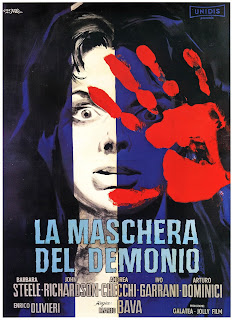Black Sunday (1960)
Before Dario Argento, Lucio Fulci and Deodato Ruggiero, there was one undisputed king of Italian horror: Mario Bava. Truthfully, it wasn't hard to be such when he was the only one making such movies for a while. Benito Mussolini, during his time as the country's dictator, had banned the making of horror films, and most post-war Italian directors seemed more interested in either more realistic or artistic cinematic pursuits.
Bava himself was born to a father who worked in cinema, so young Mario followed in his footsteps and soon became one of the most in-demand cinematographers in the country. Thus, when he finally got to do his own film, the studio had confidence in him, giving him a larger budget and an extended shooting schedule. Their faith was rewarded as La maschera del demonio, known internationally as Black Sunday, not only made money for Galatea Studios in Italy, but became American International's biggest hit up to that point in the United States.
In the early 17th century an area of Moldavia has come under attack by the vampires. Princess Asa Vajda (Barbara Steele) and her consort, Igor Javutich (Arturo Dominici) both have an iron "Mask of Satan" nailed to their faces. Before the mask can be put in place Princess Asa curses her family, as it is her brother who has ordered her execution. Before the bodies can be properly burned a storm arises and extinguishes the flames. Javutich is buried on unhallowed ground, while Asa is buried in the family vault with wards to prevent her from rising.
Two centuries later the ruins of the Vajda chapel are visited by Dr. Chroma Kuvajan (Andrea Checchi) and Dr. Andrej Gorobec (John Richardson), who are on their way to Moscow for a medical conference. There they meet Katja (Steele), the current princess, whose father is concerned that as the anniversary of Asa and Javutich's executions approaches that she may reach out from the grave to take Katja. His fears are warranted, as a number of events lead to the two rising and attempting to carry out their long awaited revenge.
One thing Mario Bava became famous for over the years was his use of primary colors to express and create moods. This is one of the few movies of his in black and white and, even so, he still used the lack of color to great effect. Many older black and white films used garish costumes to get the right shades of grey to appear on film, while others just used a natural setting in an attempt to make it look more like regular photography. Bava, on the other hand, had his sets made in black and white, thus increasing the gloomy atmosphere as well as making many of the scenes look otherworldly, such as the first shot of Katja with her dogs.
For the story he was working with ideas from Nikolai Gogol's novella Viy, but the story is altered to be largely unrecognizable other than taking place near a town called Mirgorad. Although much more violent than the classic Universal films it does often take its style from them, but other scenes, such as Javutich driving his phantom carriage, recall the contemporary films of Ingmar Bergman in how they are framed and shot. Bava also doesn't shy away from taking advantage of his wide-screen format, with action taking place behind and to the sides of characters.
Barbara Steele, who had to this point been working her way up from bit parts, found herself the star of this film, but also found herself afterward largely cast in horror and b-movie roles. Both her beauty and her performance helped sell the movie worldwide, although I don't know if it is her voice in the dubbing as it sounds a bit more American (Steele has a rather strict BBC accent, at least on film). Still, her acting comes through, although Arturo Dominici also is memorable as her lover Javutich. While confined by some of the usual vampiric rules some of the transformed still seem to maintain fragments of the humanity, and the way that they must be dispatched is unique to this film.
The only real problem I have with Black Sunday is that the English dub is horrible, and a major plot point, with Javutich also being a brother of Katja, was removed before American International released the movie stateside. What makes the dub even worse is that, unlike most Italian movies at the time, this was made, in English, with sound recording, rather than being filmed silent with everyone speaking their own language and having the dub done later. The decision was made to dub the film due to the thick accents, but it is often quite out of synch with what they were saying. We are getting most of the story but I fear that parts are lost due to fears of censorship at the time.
Mario Bava would begin a workmanlike schedule of helping clean up others' films as well as doing some typical Italian sword-and-sandals flicks before getting back to horror in the mid 1960s. By then his style was even more fully formed and he brought us many of the techniques that he added to the genre. Still, Black Sunday stands alone as an example of gothic Italian horror, and in one movie makes up for a span where the form was suppressed. For better, and sometimes for worse, he was responsible for making Italy a cornerstone of the horror industry in the 1960s through the 1980s.
Black Sunday (1960)
Time: 87 minutes
Starring: Barbara Steele, Andrea Checchi, John Richardson, Arturo Dominici
Director: Mario Bava




Comments
Post a Comment